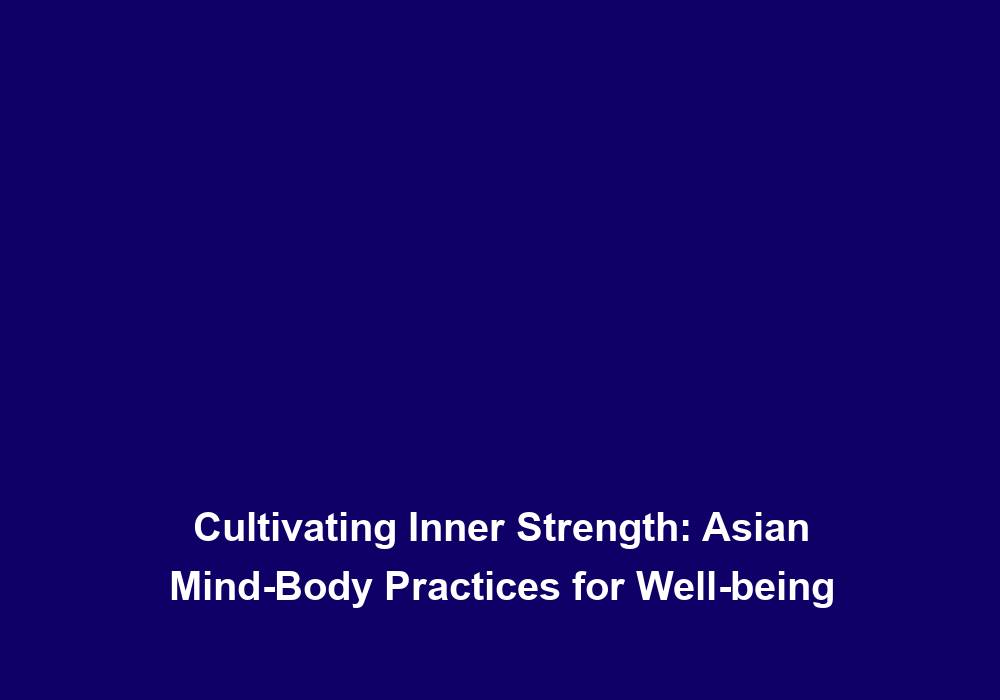Cultivating Inner Strength: Asian Mind-Body Practices for Well-being
In today’s fast-paced world, finding inner peace and maintaining overall well-being are becoming increasingly important. With stress levels on the rise, many individuals are turning to ancient Asian mind-body practices as a way to cultivate inner strength and achieve a balanced and harmonious state of being. These practices, rooted in centuries-old wisdom, offer powerful tools for self-care and personal growth. In this article, we will explore some of the most effective Asian mind-body practices that can help enhance your well-being.
1. Meditation Techniques
Meditation is a cornerstone of many Asian mind-body practices. It involves training the mind to focus and redirect thoughts, leading to a state of mental clarity and emotional calmness. Practicing meditation regularly can have a profound impact on your overall well-being. Here are a few meditation techniques widely practiced in Asia:
Mindfulness Meditation
Mindfulness meditation is a technique that involves paying attention to the present moment without judgment. By focusing on the sensations of breathing or bodily sensations, individuals can develop a heightened awareness of their thoughts and emotions, ultimately leading to a greater sense of peace and well-being. Mindfulness meditation can be practiced anywhere, anytime, making it accessible and easy to incorporate into your daily routine.
Loving-Kindness Meditation
Loving-kindness meditation, also known as Metta meditation, involves cultivating feelings of love, compassion, and goodwill towards oneself and others. By repeating specific phrases or visualizing loved ones, this practice helps foster empathy and strengthen relationships, ultimately enhancing overall well-being. Loving-kindness meditation can be particularly beneficial for reducing stress, improving self-esteem, and promoting a positive outlook on life.
Zazen Meditation
Zazen meditation is a central practice in Zen Buddhism. It involves sitting in a specific posture, focusing on breath awareness, and maintaining a state of non-judgmental awareness. Through regular practice, individuals can develop a deep sense of presence and gain insight into the nature of reality. Zazen meditation cultivates inner strength by fostering a sense of acceptance and equanimity in the face of life’s challenges.
2. Tai Chi
Tai Chi, an ancient Chinese martial art, is a gentle and flowing practice that combines deep breathing, meditation, and slow and purposeful movements. It aims to promote balance, flexibility, and inner strength. Regular practice of Tai Chi can have numerous benefits for your well-being. It improves physical health by enhancing muscle strength, coordination, and flexibility. Additionally, it reduces stress levels and promotes relaxation, leading to a greater sense of overall peace and harmony within oneself.
3. Qi Gong
Qi Gong, which translates to life energy cultivation, is a holistic system of coordinated body postures, movement, breathing techniques, and meditation. It aims to balance and cultivate the flow of Qi (vital energy) within the body. Regular practice of Qi Gong can enhance physical vitality, emotional well-being, and overall health. It promotes the smooth circulation of energy throughout the body, strengthens the immune system, and reduces stress and anxiety. Qi Gong also helps improve concentration and focus, allowing for a more centered and balanced state of being.
4. Yoga
Although originating from ancient Indian philosophy, yoga has gained immense popularity worldwide. It combines physical postures, breathing exercises, meditation, and ethical principles to promote overall well-being. Yoga practices, such as Hatha, Vinyasa, and Kundalini, focus on strengthening the body, calming the mind, and connecting with one’s inner self. Regular practice of yoga can improve flexibility, balance, and strength. It also reduces stress and anxiety, enhances mental clarity, and promotes a sense of inner peace and well-being.
5. Acupuncture
Acupuncture, a traditional Chinese medicine practice, involves the insertion of thin needles into specific points on the body. It is believed to stimulate the flow of Qi and restore balance within the body’s energy systems. Acupuncture can help alleviate various physical and mental health conditions, including chronic pain, stress, anxiety, and insomnia. By targeting specific acupuncture points, this practice promotes the body’s natural healing abilities and supports overall well-being.
6. Ayurveda
Ayurveda, an ancient Indian holistic healing system, emphasizes the balance between mind, body, and spirit. It includes various practices such as herbal medicine, dietary changes, meditation, and yoga. Ayurvedic principles help identify an individual’s unique mind-body constitution and provide tailored recommendations for optimal health and well-being. By following Ayurvedic practices, individuals can address imbalances, boost their immune system, and cultivate a state of overall well-being.
7. Mindful Eating
Asian cultures place great importance on mindful eating, which involves paying full attention to the sensory experience of eating, such as taste, smell, and texture. By slowing down and savoring each bite, individuals can develop a deeper connection with their food, improve digestion, and maintain a healthy relationship with eating. Mindful eating practices can also help prevent overeating and promote a balanced and nourishing diet, contributing to overall well-being.
8. Herbal Medicine
Asian traditional medicine systems, such as Traditional Chinese Medicine and Ayurveda, utilize a wide range of herbs and natural remedies to promote physical and mental well-being. These natural remedies aim to restore balance within the body and address specific health concerns. Herbal medicine can be used to support various aspects of well-being, including immune function, digestion, stress management, and mental clarity. Each herb has unique properties and benefits, and when used properly, can contribute to the cultivation of inner strength and overall wellness.
Incorporating these Asian mind-body practices into your daily life can significantly enhance your overall well-being. Whether you choose to practice meditation, engage in Tai Chi or Qi Gong, explore the benefits of acupuncture, or adopt mindful eating habits, cultivating inner strength is within your grasp. Embrace these ancient wisdoms, and embark on a journey towards a more balanced and harmonious state of being.
Please note that this article provides an overview of Asian mind-body practices and should not substitute professional medical advice. If you have specific health concerns, it is always recommended to consult with a qualified healthcare provider.







